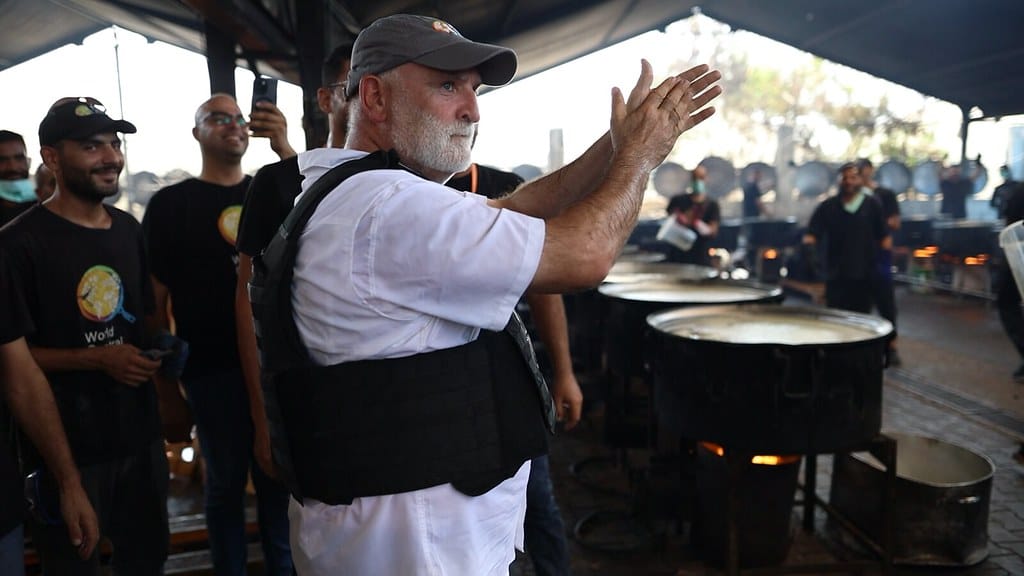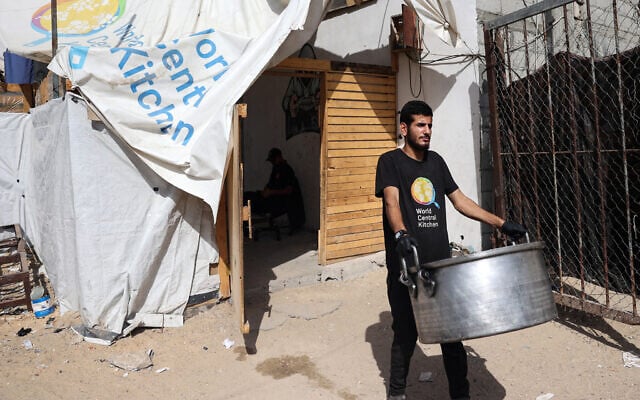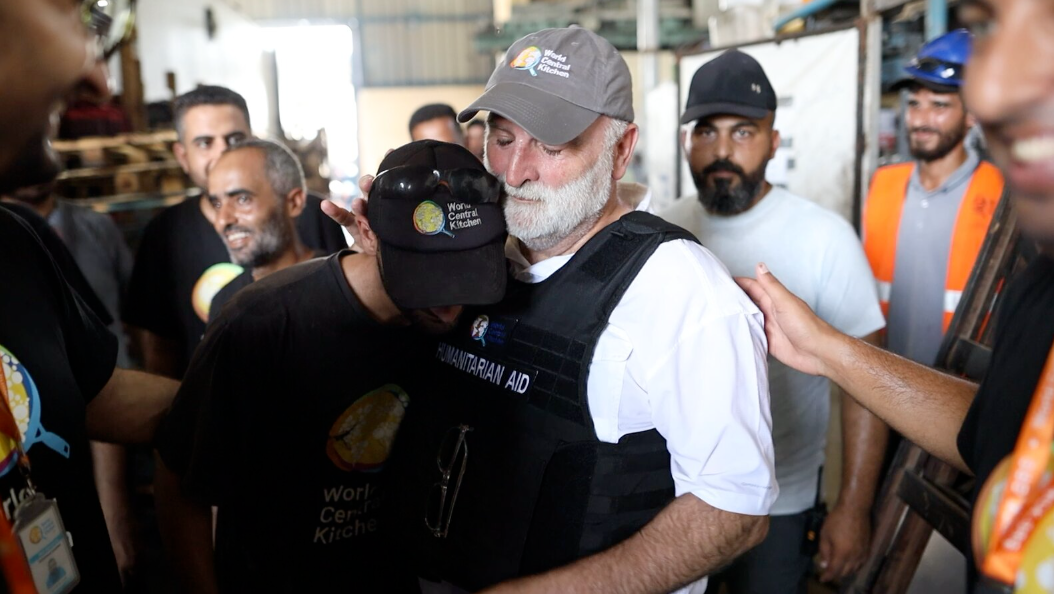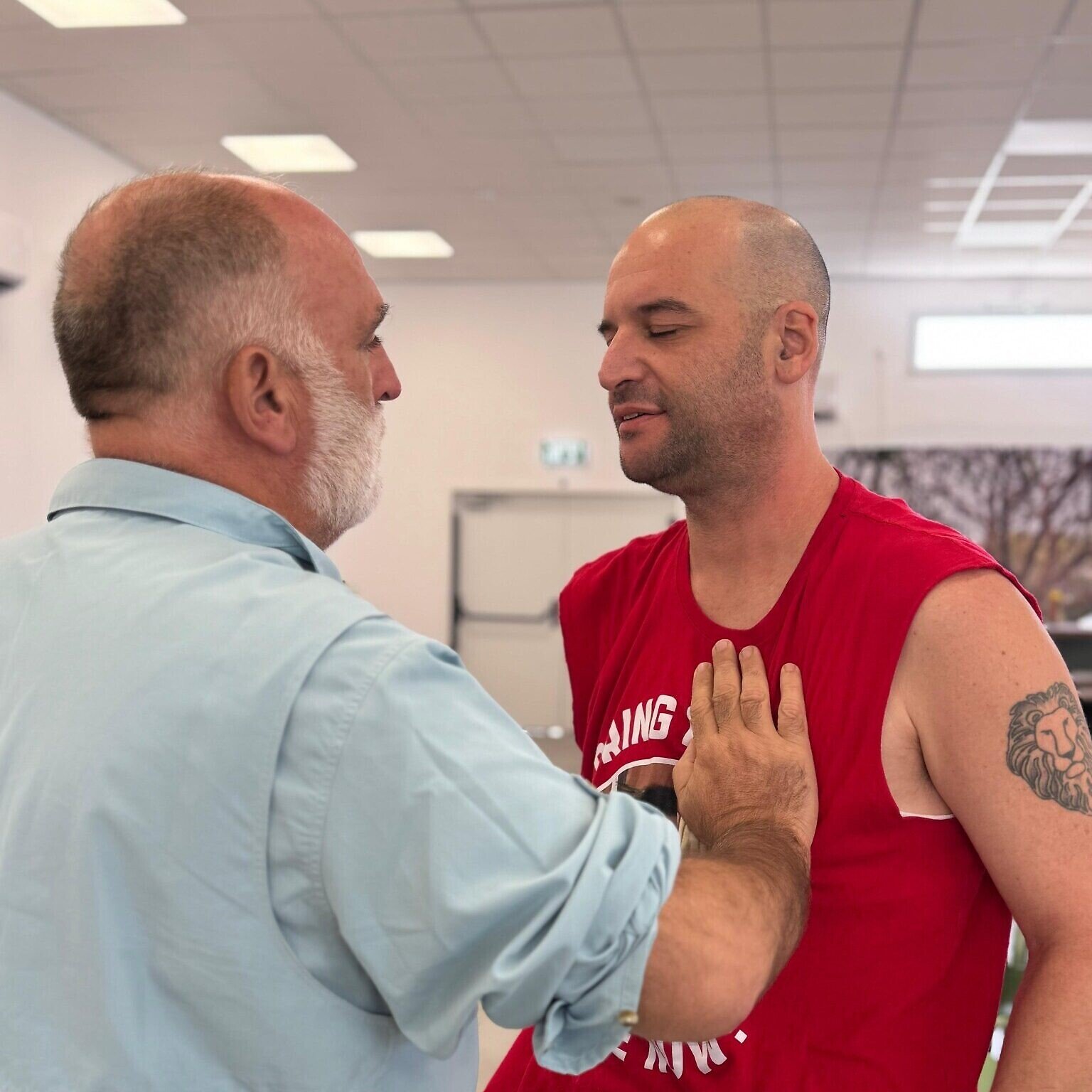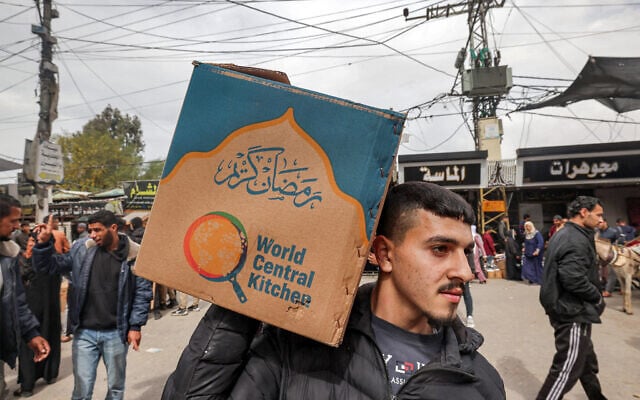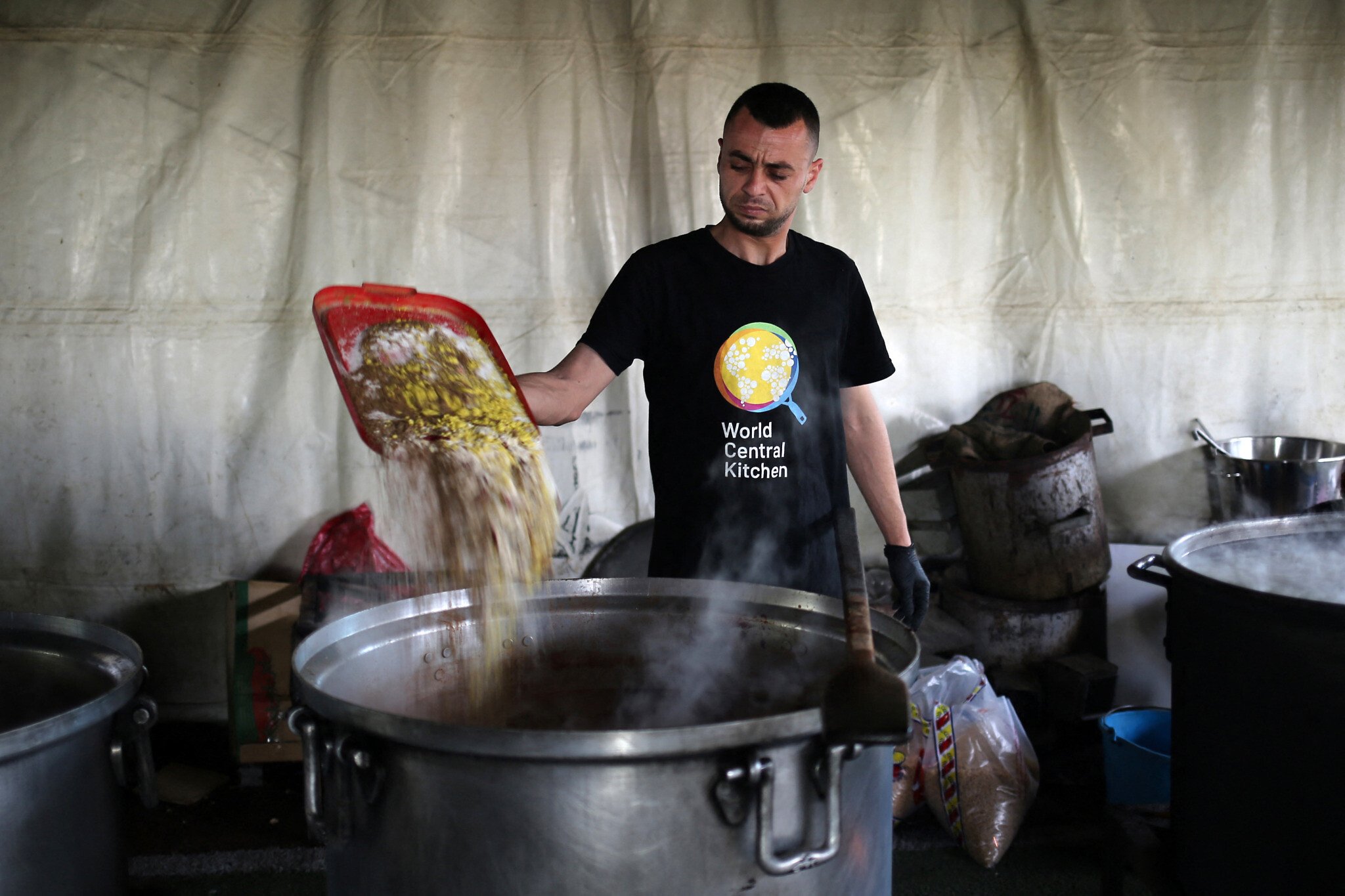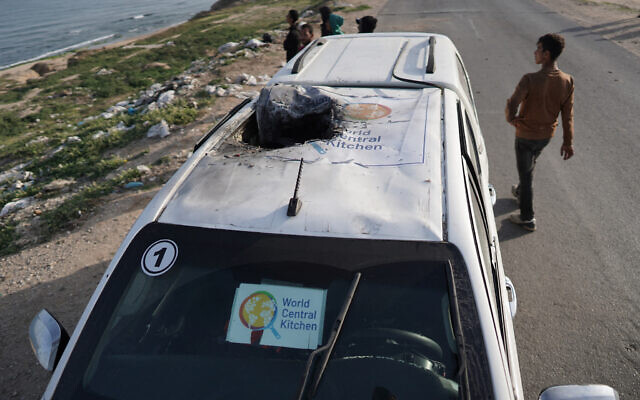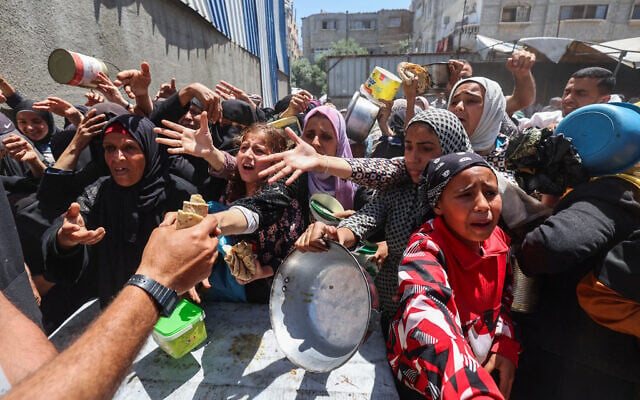


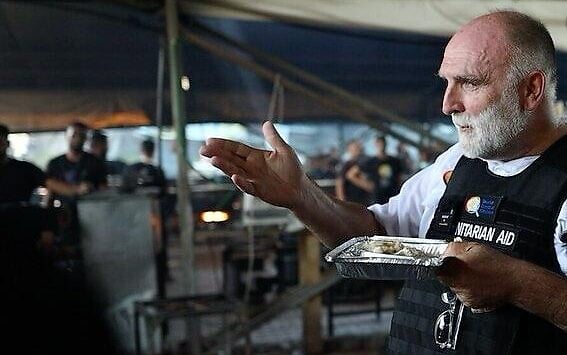
There is something symbolic about meeting José Andrés over lunch. The Spanish-born chef moved to the United States in his early 20s and spent decades running the kitchens of various high-end restaurants across the country.
In 2010, Andrés shifted his focus away from sating the appetites of the well-to-do and founded World Central Kitchen, a non-profit organization dedicated to feeding people in disaster zones.
Since then, the organization has operated in crisis areas worldwide, responding to natural disasters, the COVID-19 pandemic and wars, including providing hot meals and bread to refugees following Russia’s 2022 invasion of Ukraine.
In October 2023, WCK began working in Gaza for the first time, alongside operations in Israel to support families displaced by Hamas’s October 7 attack in the south and the war with Hezbollah in the north.
In April 2024, Andrés rushed to the region following the killing of seven WCK staff members in Gaza by IDF fire. This week, he was back in Israel and Gaza for a second time to meet with those affected by the ongoing war.
“The destruction is massive,” Andrés, 56, told The Times of Israel over a plate of hummus in Jaffa. “To see Rafah in such [a state]… to see Khan Younis, to see all that destruction is very shocking.”
What he saw inside Gaza reminded him of a dystopian, post-apocalyptic wasteland seen only in Hollywood.
“It looks like a ‘Mad Max’ movie in some places inside Gaza, with trucks burned on the side of the road, upside down — it’s ‘Mad Max,'” he said.
WCK “can’t leave [Gaza] knowing it’s happening,” he said of the current state of the Strip. “I don’t think Israel can leave [the situation like that].”
With millions struggling to stay alive and feed themselves amid the ruined landscape, Andrés had announced the ambitious goal of expanding WCK’s operations fivefold to provide a million meals a day for Gazans.
“There is hunger in Gaza,” he said. “I don’t know how much, but there is hunger in Gaza. And we need to make sure there’s no hunger in Gaza.”
WCK operates by deploying chefs who use local networks to provide food in times of crisis. Later, once established, the organization relies more on local communities to cook the meals.
In Gaza, its operations have been largely dependent on how much aid it has access to, which shifts depending on the amount of food Israel allows into the Strip.
In May, after two months in which Israel cut off the entry of any aid into the Strip, WCK announced that it had been forced to shut down its community kitchens due to food shortages.
Though he thought Israel’s aid cut-off was “not smart,” he did not blame the Coordinator of Government Activities in the Territories, or COGAT, the Defense Ministry body responsible for allowing humanitarian aid into Gaza.
“I know COGAT, the people of COGAT, and they have been doing the best job they can. But at the end, COGAT can only do what the government lets it do,” he said.
During the freeze, Jerusalem had claimed that Gaza could be sustained by aid which flooded the Strip during the two-month ceasefire that ended in March, arguing that assistance could only resume if a way was found to keep it from being looted by the Hamas terror group.
The move, Andrés countered, hurt ordinary Gazans more than Hamas.
“If you’re trying to make some people go hungry because you think you are going to win the war that way, I don’t think the guys with the guns have ever gone hungry in their entire life,” he said. “I’m not a military strategist, but I can guarantee you those will be the last people going hungry. You are going to deprive food from a million people, trying to have 5,000 surrender?”
“I think a lot of people around the world and in Israel will agree — humanity itself, we take care of each other, children, women,” he added.
Israel began allowing more aid in later that month, allowing WCK to ramp its activities back up.
Today, WCK runs one central field kitchen in Deir al-Balah — one of the few areas in Gaza largely untouched by Israeli ground operations so far — and supports local bakeries, provides clean drinking water, and helps run 25 community kitchens across the Strip. On August 14, WCK announced it was delivering 200,000 meals per day in Gaza.
During his visit, Andrés toured the Deir al-Balah operation, as well as bakeries supported by the organization.
Having been in both Gaza and Israel, he said he was struck by how little many Israelis seemed to know about conditions inside the Strip. He recalled being surprised when he was asked by protesters demonstrating for the release of hostages to relay what was happening inside Gaza due to what they said was a lack of coverage by the Israeli press.
“Wow, I didn’t realize that part of the Israeli population doesn’t seem to be fully aware of what’s going on inside Gaza,” he said.
Unlike other aid groups that issue hunger assessments, WCK, which focuses on providing hot meals, avoids publishing estimates. Still, Andrés stressed that the lack of food was plain to see.
“The starvation is real. You can’t deny it,” he said. “Is it one child, is it one thousand children, is it half a million, is it ten thousand? I don’t know. We have good NGOs that assess that. Is the number too big? Is the number too low? Are people exaggerating the number? It’s the wrong conversation.”
He noted Israel’s steps in early August to expand aid entry, including airdrops and easing restrictions for humanitarian organizations, which aid groups say have helped. According to COGAT figures, around 40,000 tons of aid entered the Strip last week, though the United Nations says about twice that is needed to feed Gazans.
“There has been an improvement in the last week but not enough. It takes time to catch up on the many weeks the borders were closed,” Andrés said.
As an independent aid group, WCK does not fall under the authority of the UN, and maintains mostly positive ties with Israel, in contrast to many other humanitarian organizations.
Andrés has been critical of Israel, but has largely kept his rhetoric from overheating. After seven staffers were killed by Israeli fire, he opined that “Israel is better than the way this war is being waged.”
When asked about his diplomatic tone, Andrés noted that WCK’s mission “is to feed people. Feed people with dignity.”
“I criticize Prime Minister Netanyahu — at the end you have to criticize the leader, you can’t criticize the entire people of Israel, those are different things,” he said. “I don’t know what’s happening with Hamas, but we know the civilian population has suffered. And the question is — is that the right way to do it?”
Immediately after Hamas’s October 7 massacre, WCK began offering assistance to the hundreds of thousands of Israelis displaced in the south and tens of thousands evacuated from the north. In June, WCK was back at work in Israel, feeding those displaced by the war with Iran.
Visiting this month, Andrés met with many Israelis, including former hostages and families of those still held captive. Among those he spoke with was Iair Horn, who was released in February and whose brother Eitan remains in Hamas hands.
He also met President Isaac Herzog and visited the site of the Nova music festival massacre. In his public statements about the war in Gaza, Andrés often calls for the release of Israeli hostages still held by Hamas.
In this interview as well, he sought to highlight suffering on both sides.
“It was very shocking to me to go the same day to Gaza and then to… the Nova festival. To witness the suffering of the people in Gaza and the suffering here… if you take away the location, the nationality of the people, and listen to their stories, I have 100 percent belief that the people on the other side will feel only empathy,” he said. “When in one day you do both, in my case, you cry inside.”
He called the atrocities of October 7 “a low point for humanity itself.”
“But where we are today is also a low point for humanity itself,” he added. “Every country should defend itself and its citizens, but I think history has shown very often that other countries have fought terrorism without the destruction of entire communities or villages.”
After the Israeli strike in April 2024 that killed seven World Central Kitchen workers, the organization suspended its operations in Gaza for about a month. It paused again in November 2024, when additional staff members were killed by Israeli fire. At the time, the IDF claimed that one of the Palestinian employees who died had taken part in the October 7 massacre.
A month later, WCK announced it was resuming operations in Gaza, while also firing 62 of its 500 local employees following vetting by Israel.
An IDF probe immediately after the April incident found that officers had ordered a series of strikes on a WCK convoy after suspecting they carried Hamas gunmen, despite WCK having coordinated its movements with the army.
“The attack on the three vehicles was carried out in serious violation of the relevant orders and instructions,” the IDF said, firing two officers involved in the killings of the seven staffers.
Andrés said talks were still ongoing with Israel regarding what went wrong, and referenced compensation negotiations.
“We are still looking for answers, to take care of the families by the Israeli government, which we are in the process of finalizing,” he said. [We want] to get a full account of what really happened, the people who didn’t follow protocol and made that happen — reprimand them. President Herzog, I saw him yesterday and he again sent his regards to the families [of those killed] and said how sorry he was.
“That’s why I want a ceasefire — to make sure we can take care of the people working in WCK,” he added.
On August 12, the IDF announced it had killed five armed fighters in Gaza who were near a vehicle marked with the WCK emblem who had posed “a threat to soldiers.” In this case, though, the vehicle had no connection to the organization and WCK was consulted before the strike.
WCK confirmed the details, stating that the group “condemns anyone impersonating World Central Kitchen or any other humanitarians, as this endangers civilians and aid staff.”
Despite the dangers of working in Gaza, Andrés dismissed the idea that WCK could look away and abandon Gaza, noting that even Israelis had told him they would volunteer in Gaza if they could.
“There are a lot of humanitarian workers going into Gaza every week, from all nationalities — they’re no different from our workers,” he said. What can I do? Leave them alone?”
During his Gaza visit, Andrés announced plans to expand its field kitchens and receive approval to bring in more food supplies as well as fuel, as he sought to ramp up operations to provide one million daily meals.
“We want to make sure we are feeding — it’s what we do, we are empowering Palestinians to do it,” he told The Times of Israel. “I believe multiple kitchens are better, multiple bakeries are better, letting Palestinian workers make money, to reconstruct, to go back to work. Our model: every meal, we make sure it gets to the right people.”
His vision is challenged by the prevalence of the looting of aid trucks, usually by hungry Gazan individuals. UN figures for last week, showed less than 8% of aid trucks making it to their destination with goods intact; of 199 aid trucks collected by WCK from August 10 to August 17, 187 were intercepted en route, the data shows.
Andrés argued that the problem could be solved through volume.
“You can achieve no looting in a very simple way: flood the gates, and the security situation stops immediately. If [Gazans] are hungry, what do you expect?” he asked. “We need more trucks. The trucking companies need more trucks — the tires are broken, the motors are broken, it’s a lot of things,” he said.
Allowing in more aid “is a win-win for everybody, a win for the Israeli people and obviously for the Palestinian people,” he added.
Andrés said he refuses to take sides in the Middle East, “but obviously I listen and I care.”
“I know people call me naive, but when I saw these people, young men and women (in Gaza) cooking and they want to feed their families, and they want to have a job,” he said. “We can’t see images of children hungry or worse. It’s an atrocity, and hopefully it will end soon, and the hostages will be released, and hopefully we will have the right leaders from both sides to have some kind of a conversation.”
“In the end, Israelis and Palestinians don’t have to be best friends, but they have to coexist,” he added.
The chef-cum-humanitarian recalled his amazement at hearing from families of hostages that decades ago, they would visit Gaza to buy fish from seaside markets.
“My God, what have we done in 45 years? And can we go back to that one day?” he asked. “There’s no other way.”

